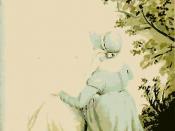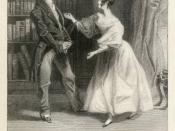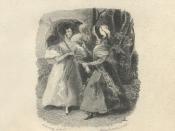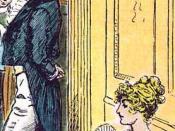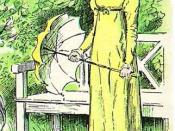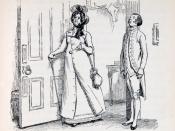We first hear of Mr Collins, one of Mr Bennet's distant cousins, in a letter
addressed to the family living in the house which after Mr Bennet's death will
become his own. In this letter he sounds very pompous, irrelevantly
reiterating and repeating the name of his patron, Lady Catherine de Bourgh.
Mr Collins is honest that he has an ulterior motive for wanting to stay at
Longbourn: he wishes to take the hand of one of the Bennet sisters in a
marriage which would ensure that at least one daughter of Mr Bennet would
remain comfortable, living at Longbourn as 'Mrs Collins'. He does not ask to
stay at Longbourn, he expects his stay to be welcomed, and even desired, by
the Bennet family. "I remain, dear sir, with respectful compliments to your
lady and daughter": this quote shows how ingratiating Mr Collins is: a side of
his character which the reader sees more readily during the rest of the novel.
Having previously thought Mr Collins was an "odious man", Mrs Bennet is
quick to change her mind after Mr Collins made compliments towards her
daughter (and herself) in the letter.
Upon arrival at Longbourn Mr Collins assures that "the young ladies I come
prepared to admire". The word 'prepared' in this quote gives the implication
that Mr Collins does nothing in a rash manner and has everything planned in
what appears to be quite a sly way. Once inside the house Mr Collins begins
to commend each and every item of furniture within it. Mrs Bennet would on
any other occasion have been delighted at this, but she knows that when Mr
Collins entails the estate all that he admires will be his own. Mr Collins
believes that by ingratiating Mrs Bennet about her house he will please her,
but this begins to vex her a fair deal. "The girls were not the only objects
of
Mr Collins desire", here we can see that Mr Collins views the girls as nothing
more than materialistic, as objects.
By the evening, Mr Collins is getting somewhat tiresome as he "eloquently
praises" his patron, Lady Catherine de Bourgh, with great vivacity and
unstoppable determination. "Lady Catherine was reckoned proud by many
people"; Mr Collins cannot see that Lady Catherine is proud because he is
proud himself and rates Lady Catherine very highly: perhaps high enough to
warrant a little, or is Lady Catherine's case a lot, of pride. Mr Collins is
also
very much in awe of Lady Catherine - another reason why he does not see her
as other do. Mr Collins informs Mrs Bennet that he lives near Lady Catherine
is his "humble abode". He is trying to make himself sound more lowly than
he really is. He uses the phrase "humble abode" to demean himself and
elevate Lady Catherine. "I am happy on every occasion to offer those delicate
little compliments which are always acceptable to ladies", it is obvious by
this
that Mr Collins is ingratiating with every woman he meets. His
complimentary manner is usually planned, but he gives it "as unstudied an air
as possible". Mr Bennet is quite amused by Mr Collins and realises that he is
"as absurd as he had hoped". When Mr Collins begins to read from a book
aloud, he takes down the most intellectual looking and begins reading with a
very dull tone which proves boring for everybody, especially Lydia, who
interrupts loudly and raucously.
The opening sentence of chapter fifteen is very ironic: "Mr Collins was not a
sensible man". It is also stated that chance (rather than ability) got him
Lady
Catherine as his patron. As a clergyman, his right as a rector has made him "a
mixture of pride, obsequiousness, self importance and humility". Mr Collins
is also rather vulgar, lacking subtlety and obvious care. Mr Collins main
reason of staying at Longbourn was to take one of the Bennet sisters' hands
in marriage. He felt that he could have whichever daughter he chose, whether
she wanted him or not. It is obvious that it does not take very much to change
Mr Collins' mind. As soon as Mrs Bennet informs him that Jane is no longer
available, he instantly diverts his attentions to Elizabeth.
Mr Bennet encourages Mr Collins to attend Meryton with the other Bennet
girls. This is because Mr Bennet is tired by Mr Collins who he found amusing
for a time before growing exceedingly bored of him. When Mr Collins and
the girls arrive at Mrs Philips' house, Mr Collins begins to ingratiate Mrs
Philips as he did Mrs Bennet. Upon his return to Longbourn Mr Collins
"gratified Mrs Bennet by admiring the manners and politeness of Mrs
Philips". "He had never met with so much attention in the whole course of his
life", this statement implies that Mr Collins is perhaps rather lonely and
very
much an attention seeker. He talks about Lady Catherine every time he feels
that nobody is paying very much attention to him.
Mr Collins vexes Elizabeth at the ball by telling her that he will be dancing
first with her; he doesn't understand that Elizabeth wants to dance with
Wickham. Mr Collins thinks that he is too irresistible to miss out on. When
Elizabeth first senses that Mr Collins intentions with her are more than
friendship, she instantly realises that there is nothing the world which would
make her want to marry him. It is now obvious that Elizabeth holds an
extreme dislike for Mr Collins. At the ball Mr Collins suggests to Elizabeth
that he would like to make himself known to Mr Darcy, a nephew of Lady
Catherine. Elizabeth tries to advise him against it, but Mr Darcy claims: "I
consider myself more fitted by education and habitual study to decide on what
is right than a young lady like yourself". This comment would make Elizabeth
want to see the stubborn and arrogant Mr Collins make a fool of himself.
When Mr Collins proposes to Elizabeth he does not sound nervous and his
proposal is well rehearsed. If Mr Collins truly cared about Elizabeth and if
Mr Collins truly loved Elizabeth he would be a lot more nervous than he
actually is. Mr Collins' proposal is almost clinical in its style and tone.
His
pomposity and arrogance show through when he expects Elizabeth to accept
him. Mr Collins, after realising that Elizabeth does not want him, informs her
of the fact that no other man would want her because of her poor status and
social standing.
